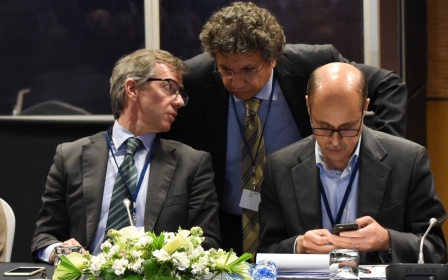Libya rivals fight for control of National Oil Corporation

The battle for Libya's oil wealth has taken on new dimensions as rival governments lay claim to the National Oil Corporation, further deepening divisions in the volatile North African nation.
The economy has been reeling since December, when production fell to around 350,000 bpd.
On Monday, the government loyal to the House of Representatives (HoR), which sits in the remote east between the cities of Tobruk and Baida, severed ties with the Tripoli-based National Oil Corporation.
"The legitimate Libyan government... is the only legitimate channel that has the right to deal and to contract companies to authorise gas and oil sales," it said in a statement.
To be valid, such sales must be made via the new NOC headquarters in the eastern city of Benghazi and approved by company chairman al-Mabrook Abu Seif, it said.
The statement, published on its Facebook page, did not elaborate on how new contract payments should be made, but anyone who violates its decisions will be prosecuted, it said.
On Thursday, the NOC board in Tripoli hit back.
"The NOC's position is neutral and receives no directives from either the Tripoli- or Baida-based governments and operates in complete independence from both sets of authorities," it said in a statement in English.
The NOC said it would continue to operate from Tripoli, where it was founded in November 1970, and would "remain an independent institution that operates outside political disputes".
"It really is a messy situation, with two governments, two parliaments, two heads of the same central bank, and now two NOCs!" said Valerie Marcel, an associate fellow at London's Chatham House.
The expert on oil and energy issues noted that "the two governments and their militias were already battling it out for control over oil production and export infrastructure".
"Creating a rival NOC in Benghazi creates a whole new level of complexity and uncertainty for oil buyers," she said.
But Abu Seif, chairman of the Benghazi-based NOC, disagreed.
"We sought to run the NOC in a neutral fashion but we have failed since Fajr Libya seized Tripoli and put the headquarters under its control," he said.
Abu Seif said he would respect the terms of contracts which have already been struck with the Tripoli headquarters - but stressed that new ones must get his approval.
A long way from unity deal
Meanwhile, the UN's Libya envoy warned on Saturday that an agreement between the strife-torn country's rival political factions is still a way off.
Three days of UN-mediated talks that began on Friday are aimed at reaching an agreement to form a national unity government.
"An agreement is going to be difficult, we are still a long way off," UN special envoy Bernardino Leon told Spanish daily newspaper El Pais from Morocco.
On Friday, an AFP photographer said, there was fighting between pro-HoR forces and militias of the Fajr Libya coalition in the vicinity of Aziziya, 35 kilometres (22 miles) south of the capital.
On Saturday, there was further fighting in another sector 80 kilometres to the south.
"We think this activity is linked to the negotiations," Leon was quoted by El Pais as saying.
"In both camps, there are the hardliners and the moderates," he said. "The moderates want to reach an agreement, while the hardliners prefer a military solution, they want to impose it on the other party by force."
"The international community can't accept such an outcome.
"What the international community didn't do well after the 2011 intervention is not to stay on the ground. It wasn't about rebuilding a state, it was about building one from scratch," he said.
Leon later called the latest fighting an "operation that we condemn in the strongest terms because it's undermining the dialogue in the decisive moment".
Leon has said the talks in Morocco would focus on security arrangements, the creation of a national unity government and confidence-building measures.
"By Sunday, we would like to have these three documents ready and if possible, published, as already agreed (as) part of what will be a final package," he has said.
Stay informed with MEE's newsletters
Sign up to get the latest alerts, insights and analysis, starting with Turkey Unpacked
Middle East Eye delivers independent and unrivalled coverage and analysis of the Middle East, North Africa and beyond. To learn more about republishing this content and the associated fees, please fill out this form. More about MEE can be found here.




